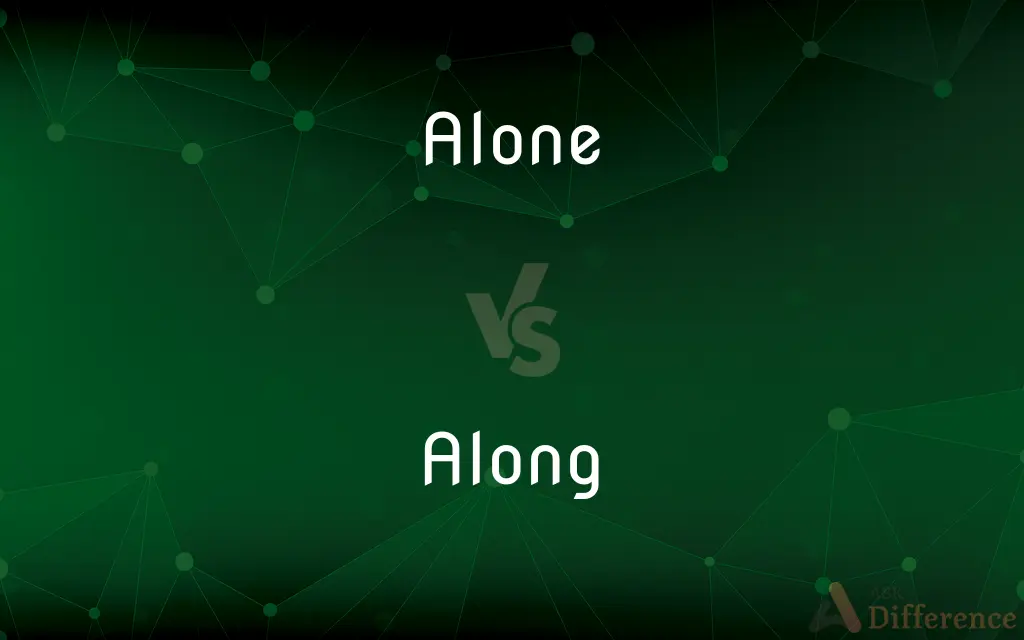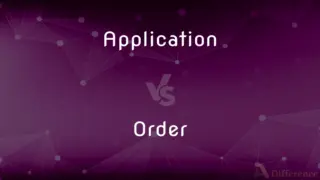Alone vs. Along — What's the Difference?
By Tayyaba Rehman — Updated on September 24, 2023
Alone" denotes solitude or a state of being without others, while "Along" suggests movement or position in a linear direction or path.

Difference Between Alone and Along
Table of Contents
ADVERTISEMENT
Key Differences
"Alone" and "Along" are words that differ in both meaning and application. "Alone" primarily conveys a state of solitude, indicating the absence of others. For instance, someone might say they live alone, highlighting the lack of cohabitants. On the other hand, "Along" pertains to a direction or path, often indicating movement or position. If you were describing a journey, you might mention the sites you saw along the way.
Furthermore, "Alone" emphasizes a single entity's isolation, whether it's a person, an object, or an idea. For instance, a single tree standing in the midst of an empty field could be described as standing alone. Contrarily, "Along" carries with it a sense of continuity, a progression from one point to another. Walking along a beach denotes a journey across its length.
"Alone" can also capture a sentiment or feeling. A person can feel alone in a crowd, signifying a sense of emotional or psychological isolation. On the opposite end, "Along" can represent accompaniment in terms of direction. When someone joins you on a walk, they walk along with you.
To further differentiate: if you were in a park by yourself, you'd be there alone. If you were walking through the park, you'd be moving along the path.
Comparison Chart
Primary Meaning
Being without anyone else or being solitary.
In or to a position along a continuous path or route.
ADVERTISEMENT
Usage
Denotes solitude or the absence of others.
Describes movement or position in a direction or path.
Grammatical Role
Typically an adjective or adverb.
Preposition or adverb.
Associated Sentiments
Can imply loneliness, independence, or uniqueness.
Suggests progression, journey, or accompaniment in terms of route.
Broader Connotations
Can denote emotional, psychological, or physical solitude.
Can imply being accompanied or moving in harmony with something.
Compare with Definitions
Alone
Without any others present.
He sat alone in the room.
Along
As a companion or accompaniment.
I brought my dog along.
Alone
Singular or unique in nature.
This is the alone example of its kind.
Along
Indicating progression in a process.
As the weeks went along, progress was made.
Alone
Indicating no assistance.
She did the project alone.
Along
Over the length or direction of.
They walked along the river.
Alone
Emphasizing something's sole status.
This factor alone determined the outcome.
Along
Over the length of
Walked along the path.
Alone
Having no one else present; on one's own
She was alone that evening
He lives alone
Along
On a line or course parallel and close to; continuously beside
Rowed along the shore.
The trees along the avenue.
Alone
Indicating that something is confined to the specified subject or recipient
He is answerable to Parliament alone
It was a smile for him alone
Along
In accordance with
The committee split along party lines over the issue.
Alone
Having no one else present; on one's own
He lives alone
She was alone that evening
Along
Forward; onward
We drove along, admiring the view. Farther along, we passed a hitchhiker.
Alone
Indicating that something is confined to the specified subject or recipient
He is answerable to Parliament alone
It was a smile for him alone
Along
As company
Bring your friend along.
Alone
Being apart from others; solitary.
Along
In accompaniment or association; together
Packed an atlas along with other books. See Usage Note at together.
Alone
Being without anyone or anything else; only.
Along
With one; at hand
Luckily, I had my camera along. Our guests should be along soon.
Alone
Considered separately from all others of the same class.
Along
(Informal) Advanced to some degree
My father is getting along in years.
Alone
Being without equal; unique.
Along
By the length of; in a line with the length of; lengthwise next to.
Alone
Without others
Sang alone while the choir listened.
Along
In a line with, with a progressive motion on; onward on; forward on.
Alone
Without help
Carried the suitcases alone.
Along
In company; together.
John played the piano and everyone sang along.
Alone
Exclusively; only
The burden of proof rests on the prosecution alone.
Along
Onward, forward, with progressive action.
Don't stop here. Just move along.
Alone
By oneself, solitary.
I can't ask for help because I am alone.
Along
By the length; in a line with the length; lengthwise.
Some laid along . . . on spokes of wheels are hung.
Alone
Lacking peers who share one's beliefs, experiences, practices, etc.
Senator Craddock wants to abolish the estate tax, and she's not alone.
I always organize my Halloween candy before eating it. Am I alone in this?
Along
In a line, or with a progressive motion; onward; forward.
We will go along by the king's highway.
He struck with his o'ertaking wings,And chased us south along.
Alone
(obsolete) Apart from, or exclusive of, others.
Along
In company; together.
He to England shall along with you.
Alone
(obsolete) Mere; consisting of nothing further.
Along
By the length of, as distinguished from across.
The kine . . . went along the highway.
Alone
(obsolete) Unique; rare; matchless.
Along
Now heard only in the prep. phrase along of.
Alone
By oneself; apart from, or exclusive of, others; solo.
She walked home alone.
Along
With a forward motion;
We drove along admiring the view
The horse trotted along at a steady pace
The circus traveled on to the next city
Move along
March on
Alone
Without outside help.
The job was too hard for me to do alone.
Along
In accompaniment or as a companion;
His little sister came along to the movies
I brought my camera along
Working along with his father
Alone
Not permitting anything further; exclusively.
The president alone has the power to initiate a nuclear launch.
Along
To a more advanced state;
The work is moving along
Well along in their research
Hurrying their education along
Getting along in years
Alone
Not requiring anything further; merely.
Oral antibiotics alone won't clear the infection.
Along
In addition (usually followed by `with');
We sent them food and some clothing went along in the package
Along with the package came a bill
Consider the advantages along with the disadvantages
Alone
(hence) Used to emphasize the size or extent of something by selecting a subset.
Her wardrobe is huge. She has three racks for blazers alone.
The first sentence alone sold me on the book.
Along
In line with a length or direction (often followed by `by' or `beside');
Pass the word along
Ran along beside me
Cottages along by the river
Alone
Quite by one's self; apart from, or exclusive of, others; single; solitary; - applied to a person or thing.
Alone on a wide, wide sea.
It is not good that the man should be alone.
Along
In line with.
There are trees along the road.
Alone
Of or by itself; by themselves; without any thing more or any one else; without a sharer; only.
Man shall not live by bread alone.
The citizens alone should be at the expense.
Along
At a further point in time or space.
The shop is further along the street.
Alone
Sole; only; exclusive.
God, by whose alone power and conversation we all live, and move, and have our being.
Alone
Hence; Unique; rare; matchless.
Alone
Solely; simply; exclusively.
Alone
Isolated from others;
Could be alone in a crowded room
Was alone with her thoughts
I want to be alone
Alone
Lacking companions or companionship;
He was alone when we met him
She is alone much of the time
The lone skier on the mountain
A lonely fisherman stood on a tuft of gravel
A lonely soul
A solitary traveler
Alone
Exclusive of anyone or anything else;
She alone believed him
Cannot live by bread alone
I'll have this car and this car only
Alone
Radically distinctive and without equal;
He is alone in the field of microbiology
This theory is altogether alone in its penetration of the problem
Bach was unique in his handling of counterpoint
Craftsmen whose skill is unequaled
Unparalleled athletic ability
A breakdown of law unparalleled in our history
Alone
Without any others being included or involved;
Was entirely to blame
A school devoted entirely to the needs of problem children
He works for Mr. Smith exclusively
Did it solely for money
The burden of proof rests on the prosecution alone
A privilege granted only to him
Alone
Without anybody else;
The child stayed home alone
He flew solo
Alone
Referring to feeling isolated.
Even in a crowd, he felt alone.
Common Curiosities
Can objects be described as "Alone"?
Yes, objects can be described as alone, indicating they're solitary or unique.
Is "Along" used in terms of time?
Yes, it can indicate progression in time, like "as the years went along."
How is "Alone" different from "Lonely"?
"Alone" denotes physical solitude, while "Lonely" denotes an emotional state.
Can "Along" imply harmony or alignment?
Yes, such as in "going along with someone's plan."
Can "Along" mean being with someone?
Yes, in contexts like "coming along" or "going along," it can imply accompaniment.
Can "Alone" also mean "only"?
Yes, "Alone" can emphasize the sole status or uniqueness of something.
Does "Along" always indicate a linear path?
Most often, but it can also indicate accompaniment or progression in a non-linear context.
Does "Alone" always have a negative connotation?
No, it can also indicate independence, self-sufficiency, or uniqueness positively.
Does "Alone" always denote loneliness?
No, "Alone" can imply solitude without necessarily denoting loneliness.
Can "Along" be used in abstract contexts?
Yes, it can be used in contexts like "thinking along the same lines."
Share Your Discovery

Previous Comparison
Polychromatic vs. Polychrome
Next Comparison
Application vs. OrderAuthor Spotlight
Written by
Tayyaba RehmanTayyaba Rehman is a distinguished writer, currently serving as a primary contributor to askdifference.com. As a researcher in semantics and etymology, Tayyaba's passion for the complexity of languages and their distinctions has found a perfect home on the platform. Tayyaba delves into the intricacies of language, distinguishing between commonly confused words and phrases, thereby providing clarity for readers worldwide.















































